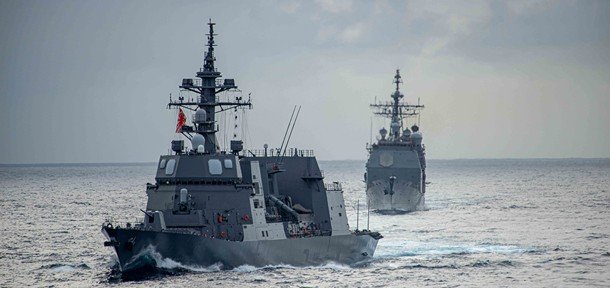Japan is playing the long game in Cambodia, but Beijing remains firmly in control. As Chinese investments flood the country—reshaping Phnom Penh and deepening its grip on key port cities like Sihanoukville—Tokyo’s attempts to counterbalance China’s dominance face an uphill battle.
Two Japanese Maritime Self-Defense Force (MSDF) destroyers, Suzunami and Shimakaze, recently docked in Sihanoukville, each carrying around 200 crew members. The port call was a calculated move: a show of presence in a region where China’s military footprint is expanding. Less than 30 kilometers away, at the Ream Naval Base, Chinese-backed upgrades are transforming the site into a strategic asset, reinforcing Beijing’s influence in Cambodia’s defense infrastructure.
Japan’s official message remains consistent—upholding a “free and open” Indo-Pacific. But in a country where China’s political and economic entrenchment has only deepened over the past two decades, real security cooperation for Tokyo remains constrained. Cambodia’s growing military reliance on Beijing complicates Japan’s outreach, with recent developments underscoring just how much the geopolitical scales have tipped in China’s favor.
Tokyo’s Diplomatic Push Hits a Wall
Japan’s pivot to Cambodia isn’t new. In 2022, Prime Minister Fumio Kishida met with Hun Manet—then poised to succeed his father, Hun Sen—to strengthen security ties. The timing was significant: it marked the 30th anniversary of Japan’s Self-Defense Forces’ deployment to Cambodia under the UN’s peacekeeping mission in the early 1990s. Japan, which played a key role in Cambodia’s post-war reconstruction, hoped to leverage this history to deepen diplomatic engagement.

The effort has yielded little in terms of tangible security gains. While Japan’s strategic outreach aligns with broader ASEAN engagement—seeking to enlist regional players to maintain the post-war international order—Cambodia has signaled no interest in shifting away from Beijing.
The docking of two MSDF destroyers was a diplomatic victory in terms of optics, but the reality on the ground tells a different story. Cambodia’s commitment to China is on full display. Shortly before the Japanese visit, Prime Minister Hun Manet publicly reaffirmed military cooperation with China, which now extends beyond traditional defense ties to include Military Operations Other Than War (MOOTW) initiatives such as mine clearance and training programs.
In November 2023, Hun Manet hosted a high-profile visit from Chinese General Li Qiaoming, commander of the People’s Liberation Army (PLA). The meeting reinforced Beijing’s military presence in Cambodia and solidified Hun Manet’s standing as China’s preferred partner. Li emphasized the “2,000-year-old historical relationship” between the two nations—an argument Japan itself echoed in its 2022 engagement with Hun Manet, underscoring how both sides use history to strengthen their diplomatic leverage.
China’s Grip Remains Firm
Japan’s challenge isn’t just influence—it’s access. Despite growing engagement, Tokyo has received no assurances from Hun Manet or his father that Cambodia won’t allow Chinese naval operations at Ream. While Cambodia’s constitution formally bans foreign military bases, history suggests legal barriers won’t be an issue if Beijing applies pressure. The ruling Cambodian People’s Party (CPP) controls all 120 National Assembly seats, meaning any constitutional amendment—should China push for one—would face little resistance.
Cambodia has already dismissed any suggestion of a regional power shift. In 2023, the government rejected proposals for ASEAN joint military exercises in the South China Sea, reinforcing its strategic alignment with Beijing.
Japan, meanwhile, has had to settle for less ambitious partnerships. A December 2023 meeting between Foreign Minister Yoko Kamikawa and her Cambodian counterpart, Sok Chenda Sophea, focused on digital and cybersecurity cooperation—critical, but a far cry from the military influence China enjoys. Tokyo’s promise to send more MSDF vessels to Ream in the future remains largely symbolic, unlikely to reshape Cambodia’s geopolitical calculus.
For now, Japan has little choice but to wait. With China firmly embedded in Cambodia’s military and economic framework, Tokyo’s long-term bet on diplomacy remains a slow-moving strategy—one that depends on shifting regional dynamics that, for now, favor Beijing.


